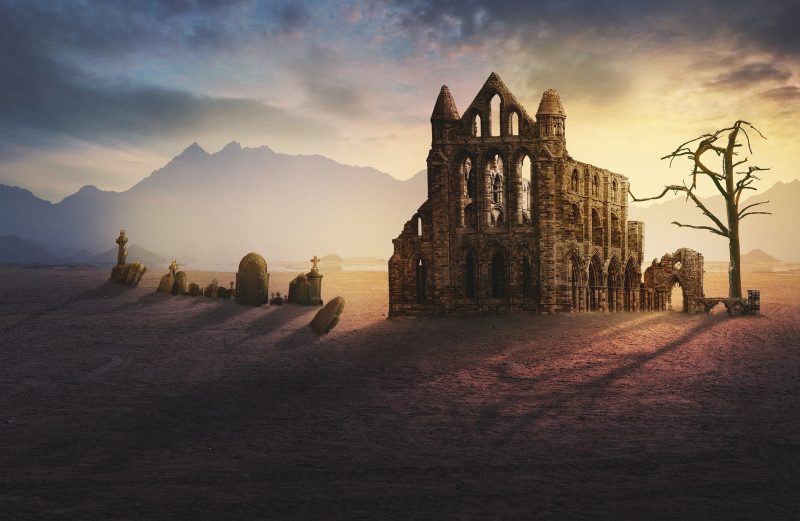
He said to me, “Son of man, look north.” I looked north and saw it: Just north of the entrance loomed the altar of the sex goddess, Asherah, that makes God so angry. …. But you’re going to see worse yet.”
I entered and looked. I couldn’t believe my eyes: Painted all over the walls were pictures of reptiles and animals and monsters—the whole pantheon of Egyptian gods and goddesses—being worshiped by Israel. In the middle of the room were seventy of the leaders of Israel …. Each held his censer with the incense rising in a fragrant cloud.
He said, “Son of man, do you see what the elders are doing here in the dark, each one before his favourite god-picture? They tell themselves, ‘God doesn’t see us. God has forsaken the country.’” Then he said, “You’re going to see worse yet.”
He took me to the entrance at the north gate of the Temple of God. I saw women sitting there, weeping for Tammuz, the Babylonian fertility god.
Finally, he took me to the inside court of the Temple of God. There between the porch and the altar were about twenty-five men. Their backs were to God’s Temple. They were facing east, bowing in worship to the sun.
Ezekiel 8:5-16 (The Message)
Ezekiel was a priest with a special concern about abuses going on in the Jerusalem temple. He had a vision in which he saw the painful details of the detestable things happening there – most notably idol worship (v5, 10) and sun worship (v 16). Israel’s spiritual leaders had lost faith in Yahweh and being seduced by the false gods of the surrounding nations they were desperately trying out these “idolatrous alternatives”. Ezekiel pulled no punches as he made it clear that the corruption and defilement of the sin of God’s people had permeated every level of society. In another vision in Chapter 10, Ezekiel saw God, utterly sick of His people’s corruption, leaving the temple. In Chapter 13 Ezekiel condemned false prophets who made up prophecies out of their own heads, then attributed them to God and told lies to delude the people with false optimism.
Ezekiel’s role, as God’s prophet, was as a watchman for the nation, to sound the alarm to warn Judah’s leaders and people of the impending dire consequences of their actions (Chapter 33). However, the people were a hardened and obstinate bunch and for much of his prophetic ministry, nobody would listen to him. Judah’s religious leaders were likened to ‘shepherds’ and Ezekiel pointedly described how the most powerful had misused their power, neglecting the weakest and most vulnerable in society, instead, using it for their own gain rather than for the good of the people. They were indicted and condemned for the Covenant neglect (Chapter 34).
Yes, but that was over 2,500 years ago. Okay, let’s reflect on something more recent and closer to home. In the early 18th century, the morality and religion of these islands were said to have collapsed to a degree never known in any Christian country. The chief characteristic of the nation was ungodliness. With the rationalism and scepticism of the Enlightenment, unbelief had become increasingly popular. Educated clergy of that day typically feared all extremes and hated enthusiasm, frowning on passionate convictions of any kind. If they believed in God, He was a remote, entirely rational being. Many clergy paid little attention to scripture and cared nothing for Jesus. They showed little or no evidence of new life in Christ, preached little more than barren moralism encouraging an anaemic and tolerant morality. Historian and philosopher Thomas Carlyle aptly described the country’s condition as “Stomach well alive, soul extinct”.
But just at the right time springs of living water would flow out into this spiritual desert. Men like George Whitefield, John and Charles Wesley, Howell Harris, Daniel Rowland, William McCulloch, James Robe and John Cennick would be the catalysts the Holy Spirit used to stir up what became known as the Great Evangelical Revival. Fearlessly and most unconventionally they sounded the alarm throughout the land. Vehemently opposed by many within the established church and forced to preach in the open air, tens of thousands of souls, whom the church had for so long ignored, forgotten, or abandoned, eagerly gathered to hear the Gospel. Many began to show a great concern for religion as they had never done before. It would openly demonstrate that when a person is truly converted to Christ, their life is changed, and they change their world.
Heavenly Father, as Your called out people, Your disciples, we come humbly before you to ask for Your forgiveness. Lord, hear our prayers and forgive how we have departed from Your ways to follow the patterns and views of this world. Almighty God, enable us to be your transforming salt, light, and yeast for our lost, hurting and fractured world. Lord, revive Your church and awaken the nations to who You are. Amen.